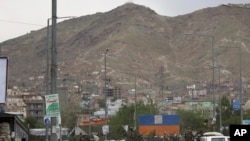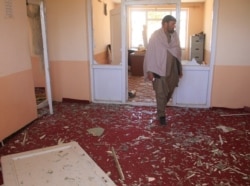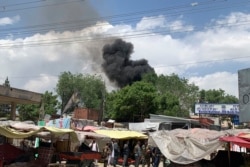A car bomb attack on an intelligence base in central Ghazni province in Afghanistan early Monday morning killed at least seven members of the security forces and wounded 40 others.
Dr. Baser Ramaki, head of the Ghazni provincial hospital that received both the bodies and the wounded, confirmed the number to VOA. Provincial officials say the number of casualties may increase.
Tariq Aryan, a spokesman for the ministry of interior confirmed the attack. Ahmad Khan Serat, a spokesman for Ghazni provincial police headquarters told VOA the bomb targeted the 703 contingent of the National Directorate of Security, Afghanistan’s intelligence agency.
An Islamic culture center was located near the site of the attack, Serat added.
Locals living near the site complained of damage to their houses including shattered glass.
Taking responsibility for the attack, Taliban spokesman Zabiullah Mujahid said in a statement the attack was in response to the enemy declaring war as well as attacks on civilians in areas under Taliban control.
He named the suicide bomber as Zayd Kandahari and said the attacker used a Humvee.
Last week, after a spate of deadly attacks including one that killed newborn babies and new mothers in a hospital in Kabul, President Ashraf Ghani ordered his forces to resume offensive operations against the Taliban and other groups. For the last two months, Afghan forces have been in a defensive mode following a deal signed between the United States and Taliban in February.
The Taliban denied responsibility for last weeks’ attacks but senior Afghan officials, including Vice President Amrullah Saleh, refused to accept their denial.
Senior American officials, including Zalmay Khalilzad, the special representative charged with helping to end the war in Afghanistan, said the attacks were carried out by the local chapter of Islamic State group, but Saleh said the Taliban had close links with IS Khorasan, as the local chapter is called.
In a separate attack Monday morning, Taliban fighters ambushed and killed seven members of a local anti-Taliban militia in Takhar province.
Khalil Aser, a spokesman for the Takhar police confirmed the attack in the Yangi Qala district and said at least two militiamen were wounded as well.
In a news conference in Kabul Monday afternoon, Afghan military and security officials said it looked as if the Taliban had started their spring offensive without the usual formal announcement of an end to the winter lull.
In the joint news conference, Masood Andarabi, acting minister of interior, Ahmad Zia Seraj, NDS chief, and Bismillah Waziri, army chief, said the Taliban have launched more than 3,800 attacks since the signing of U.S- Taliban peace deal in Doha.
The NDS chief said Taliban have recruited many students from Pakistani seminaries after their closure due to COVID-19.
He said their intelligence information shows a closed cooperation between the Taliban, al-Qaeda, Tehreek e Islami Uzbekistan, Tehreek e Turkmenistan Sharqi, and Lashkar-e-Tayba, and fighters from these groups are fighting alongside Taliban.
He also said IS Khorasan is working closely with the Haqqani network, a deadly faction of the Taliban.






